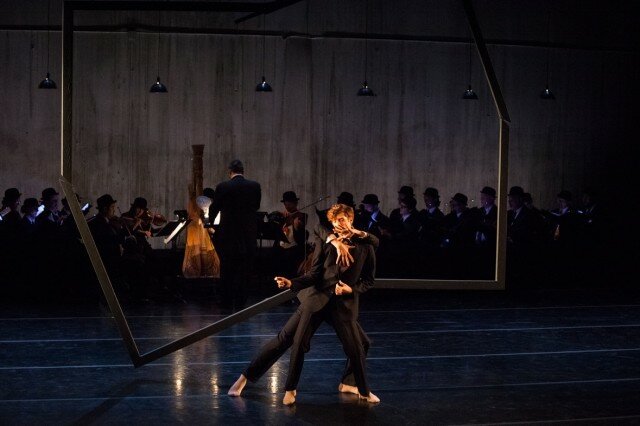Whim W’him, The Esoterics, and St. Helens String Quartet’s Exquisite “Approaching Ecstasy” Blends Genres, Bodies
Review care of SusannaDW.
“Approaching Ecstasy,” an exuberant genre-combining production by Whim W’him, The Esoterics, and the St. Helens String Quartet at the Intiman Theatre, sets the poetry of fin de siècle gay Egyptian writer Constantine P. Cavafy to music and dance. Constantine Cavafy, who died in 1933, spent his life hiding his sexuality, but his poetry–and this performance–hold nothing back. Eric Banks translated the poetry from the original Greek into “singable” English, set the love & lust poems to music he composed, and conducted the St. Helens String Quartet. He met Whim W’him choreographer Olivier Wevers through mutual friends four years ago and proposed this project. “Approaching Ecstasy” is worth the wait.
An announcement was made prior to the show asking the audience to hold our applause to the very end. Eric Banks later pointed out that one of the challenges with combining performance genres is that you also combine performance cultures. Applause, which is typical in concerts at the end of each piece, is usually reserved in dance settings until the conclusion of the show. There were a few points during Saturday night’s performance when the audience couldn’t hold back their appreciation, but for the most part, the request was adhered to. There were still sharp collective intakes of breath, particularly during the spectacular “Desires,” in which four male dancers lifted, wove, and undulated across the stage in a series of unending carries and fish dives, mirroring the poem’s passion: “O body, remember not only how much you were loved… But also remember the desires that you awakened in others.”
The stage is bare, except for the chorus, the quartet, and the minimalist but elegant and versatile set by previous Whim W’him collaborator Casey Curran. The lighting design by Jeff Forbes perfectly supports the dancers and musicians, playing a particularly impressive role in “Candles”, “In The Vestibule,” “By Chance,” and “Walls.”
The Esoterics are split into two groupings—those who sing the Greek versions of the poems are seated in the back, surrounding the Quartet. Meanwhile, the sixteen who sing the English translations are divided into two groups on either side of the stage. Everyone, male, female, dancer, musician, singer, is dressed in the same black suit, white shirt, tie, and bowler hat. In the parade of lovers described through the performance—encountered in wine shops and tobacconists, on the street and in the library—one gets the sense that passion and connection could be found at any time, with anybody. There are many encounters to be had and many approaches to ecstasy.
The only performer in a unique costume is Kaori Nakamura, who portrays “anything not human”—ethereal, abstract, and overtly balletic, hers are the only portions of the piece that don’t quite work. Ms. Nakamura is a beautiful dancer, but the form decelerates the energy of other sections.
During the first half of the 86-minute show (no intermission), the English portion is sung first while the dancing happens during the Greek. This allows the audience to create a contextual mood for the dance that follows. Andrew Bartee’s first solo dance memorably partnered him with a table, which he entered on stage carrying on his back and then proceeded to dance with, around, and over. Like so much of the evening, it was inventive and fluid. The mood is playful, experimental. Each poem and dance introduce us to a new scenario—an antique mirror content in holding the gaze of “an exceedingly beautiful boy, the tailor’s assistant/ [Who happened to be an athlete on Sundays]”, chance glances leading to an assignation behind a carriage’s closed doors, lovers leaving a shared bed.
The middle section closes in suddenly with “Walls,” during which four dancers roll the lone set piece around the stage, conveying claustrophobia and despair even while ceaselessly moving. Shane Ohmer’s section had the audience on the edge of their seats as the other dancers pushed the set and he undulated along the floor space within the box made by the walls.
The final section reverses the order, putting the original Greek poetry first. By this point in the evening, however, you may have trouble differentiating because the sensory experience is all-encompassing.
It is impossible to take part in this production without thinking about the current political climate. In “Obstacles,” we find an eerie call to our own times: “In the future, in a more perfect world, / Some fortunate man, created just like I am, will find himself / Able to live without shamefulness or hesitation, and be free.” We are in so many ways still approaching ecstasy.


 Daily Email Digest of The SunBreak
Daily Email Digest of The SunBreak